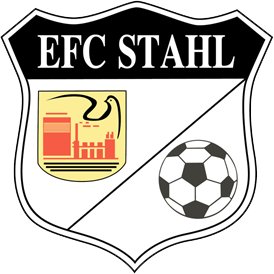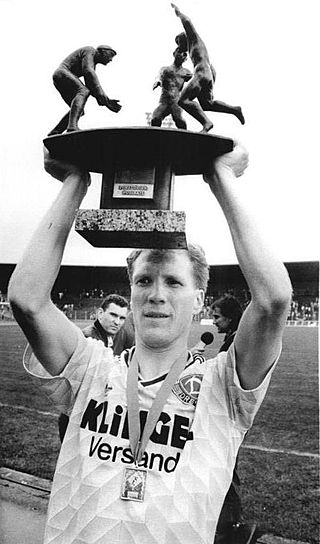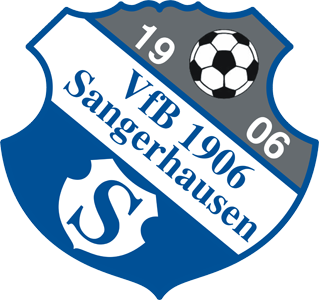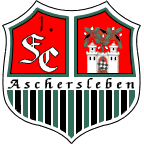
SV Babelsberg 03 is a German association football club based in Potsdam-Babelsberg, on the outskirts of Berlin. The team was founded as Sport-Club Jugendkraft 1903 and again as SG Karl-Marx Babelsberg in 1948 as successor to the pre-war side SpVgg Potsdam 03.

Eisenhüttenstädter FC Stahl was a German association football club based in Eisenhüttenstadt in Brandenburg. The club dissolved in 2016 and merged into FC Eisenhüttenstadt. FC Eisenhüttenstadt plays in the sixth tier Brandenburg-Liga as of the 2021–22 season.

The FDGB-Pokal was an elimination football tournament held annually in East Germany. It was the second most important national title in East German football after the DDR-Oberliga championship. The founder of the competition was East Germany's major trade union.

SV Dessau 05 is a German association football club based in Dessau, Saxony-Anhalt. They distinguished themselves in 1949 as winners of the inaugural FDGB-Pokal, the East German Cup.

Football in Berlin, the capital of Germany, has a long history. The city contributed 24 of the 86 founders of the DFB, the German Football Association. The DFB Cup Final has been held every year at the Olympiastadion since 1985.

FSV Optik Rathenow is a German association football club who compete in the Oberliga. The club is situated in the city of Rathenow, near Berlin, and play their home games at the Vogelgesang.

VfB Sangerhausen is a German association football club from the city of Sangerhausen, Saxony-Anhalt.
The football league system of the German Democratic Republic existed from 1949 until shortly after German reunification in 1991.
FC Grün-Weiß Wolfen was a German association football club from the industrial city of Bitterfeld-Wolfen in southern Saxony-Anhalt.

Brandenburger SC Süd is a German association football club from the town of Brandenburg, in the federal state of the same name. The footballers are part of a larger sports club that also has departments for bowling, canoeing, cycling, swimming, and volleyball.

SV Motor Altenburg is a German football club from the city of Altenburg, Thuringia. The club was established 8 March 1946 as the postwar successor to Eintracht 1908 Altenburg and was part of East German football competition. The current day club also has departments for bowling, gymnastics, and judo.

1. FC Aschersleben was a German football club from the city of Aschersleben, Saxony-Anhalt. It was the successor to Motor Aschersleben which was part of second-tier competition in East Germany in the early 1960s.

VfL Bergen is a German association football club from the city of Bergen auf Rügen, Mecklenburg-Vorpommern. The club was established in 1938 as Einheit Bergen and following World War II was reorganized as Sportgemeinschaft Rugia Bergen in Soviet-occupied East Germany.

Weißenseer FC is a German football club from district of Weißensee in the city of Berlin. The club's roots go back its founding on 8 September 1900, while more recently it has been linked with Sportverein Prussia Berlin and Pankower Fußball Verein Bergmann-Borsig.

FC Treptow is a German association football club from the city of Berlin and is the successor to Werkverein der BEWAG Berlin which was established in 1928 as the worker's sports club of the city's electric utility Bewag Aktiengesellschaft.

SV Blau-Gelb Berlin is a German football club from the city of Berlin. The club was the product of the post World War II Soviet-occupation of East Germany and, unlike most German clubs, lays no claim to any earlier tradition. Throughout its history, SV has been a multi-sports club and at various times has included departments for athletics, billiards, bowling, boxing, canoeing, cycling, gymnastics, handball, ice hockey, sailing, table tennis, tennis, volleyball, and weightlifting. Many of these departments were lost following German reunification in 1990.

Grünauer BC 1917 is a German association football club from Grünau in the Treptow-Köpenick district of the city of Berlin. The club was active under several different names in the separate East German football competition that emerged in the Soviet-occupied eastern half of the country after World War II.

The Bischofswerdaer FV 08 is a German association football club from the town of Bischofswerda, Saxony.
BSG Chemie Leipzig was a German football club from the Leutzsch district of Leipzig, Saxony. The prewar identity of the club is rooted in the establishment of Britannia Leipzig in 1899 and its successor TuRa Leipzig. During the socialist era, the traditions of the club were continued in the East German teams BSG Chemie Leipzig and SC Lokomotive Leipzig before the emergence of FC Sachsen Leipzig following German reunification, which continued the clubs traditions.















